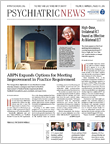The American Board of Psychiatry and Neurology (ABPN) has expanded the options that diplomates may use to meet the Improvement in Medical Practice (also referred to as Performance in Practice, or PIP) requirement for Part IV of Maintenance of Certification (MOC).
Specifically, diplomates may now use a “Clinical Module” or a “Feedback Module” to meet the PIP requirement. Prior to the change, instituted in February, diplomates did not have the option of using a feedback module to meet their Part IV requirement. (The PIP Unit is a quality improvement exercise designed to identify and implement areas for clinical improvement.)
According to the ABPN website, preapproval is not needed for using a feedback module if the questionnaire or survey meets general competencies. The six general competencies to be reviewed on the feedback forms are medical knowledge, practice-based learning and improvement, interpersonal and communication skills, professionalism, patient care, and system-based practices.
The module can consist of any one of the following feedback methods: patient feedback from five patients, peer feedback from five peers, resident evaluations from five respondents, “360 degree evaluations” from five respondents, institutional peer reviews from five respondents, and a supervisor evaluation from one supervisor. Qualified feedback modules, as well as clinical modules, are listed on the ABPN website.
Effective immediately, this development now gives diplomates more flexibility with the Part IV requirement for MOC, said ABPN President and CEO Larry Faulkner, M.D.
“As a result of the flexibility provided in the 2015 MOC standards, the ABPN has been able to make a number of changes in its MOC requirements that have made it easier for our diplomates to document their current involvement in ongoing quality improvement activities (MOC Part IV),” Faulkner wrote in comments to Psychiatric News. “Our belief is that many, if not most, of our diplomates are already involved in quality improvement activities, and we see our role as helping them to document that fact.
“There are many different activities that can contribute to quality improvement, and patient feedback and various types of peer feedback are important options that we want to recognize for diplomates who choose to use them. Constructive feedback from patients or peers can contribute valuable input to diplomates as they strive to improve the quality of care they provide.”
APA President Renée Binder, M.D., said, “I applaud the efforts of the ABPN to increase the flexibility of meeting requirements for MOC. This is a very important step in that direction. We will continue to work collaboratively with the ABPN to recommend further improvements in the MOC process.”
APA Director of Education Tristan Gorrindo, M.D., said APA has been closely following changes being made to the MOC program. “APA has been advocating for the real-world experiences of our members to be counted by the ABPN as activities that meet MOC requirements,” he told Psychiatric News. “The ABPN’s increased flexibility in meeting these requirements is consistent with our advocacy efforts.” ■
Information about options for meeting the PIP requirement and about MOC generally is posted on the
ABPN’s website. Comprehensive information about MOC is posted on
APA’s website.
